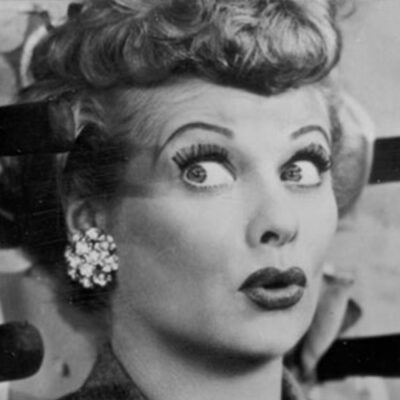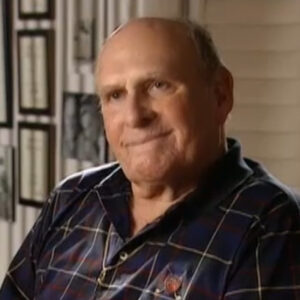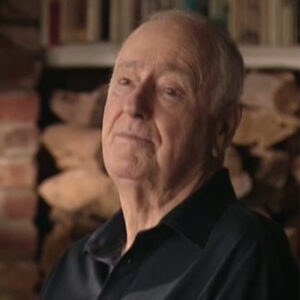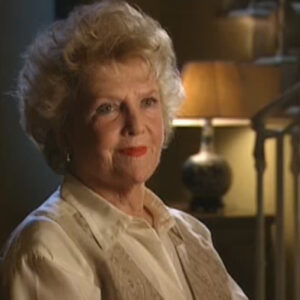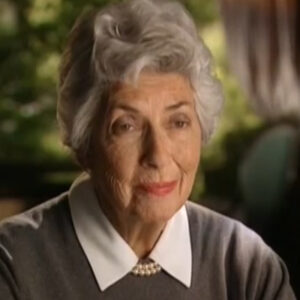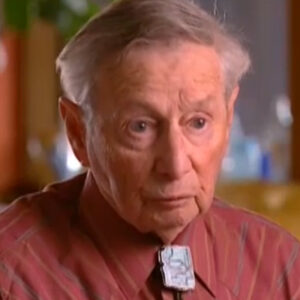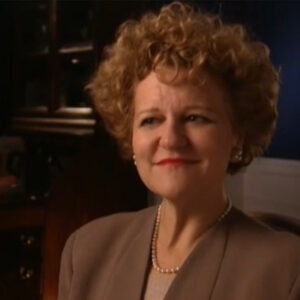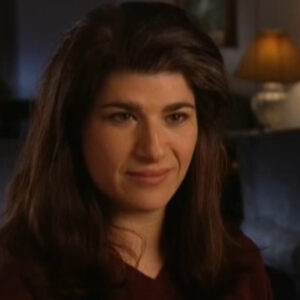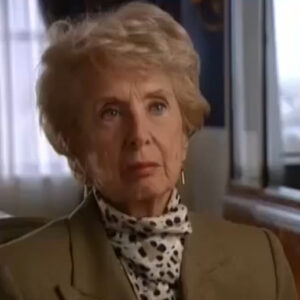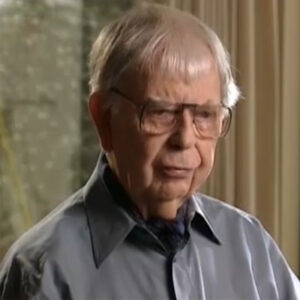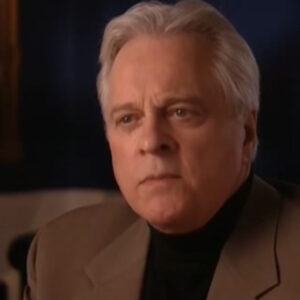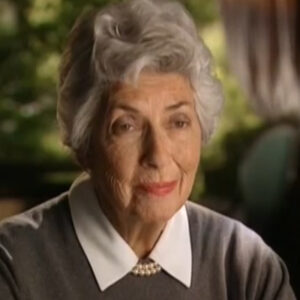Fran Drescher: I cannot tell you how many people throughout the years that I was on the nanny would send me things for I Love Lucy for Lucille Ball. And there were artists that sent me drawings of me and Lucy or rather just Lucille Ball. People were constantly sending me gifts like that. And there was a there was constantly a correlation made between myself and Lucille Ball, which is, of course, extremely flattering to me and a great honor. And consequently, I have a great collection of memorabilia and things, and some of which is like original artwork like that that people send me. Because for the I guess for the first time since Lucy, a comedian, came along that reminded them of of her doing the kind of physical comedy that she did and that I do. And I just, you know, I guess being pretty and funny. So, you know, it’s amazing. I mean, I grew up watching I Love Lucy and always being a huge fan of Lucille Ball. So to grow up and get my own television series and have people constantly connect me to her is just, you know, blows my mind and is, you know, fantastic.
Interviewer: Now, once you became a Grown-Up person and an actress and had her, we’re going to have a show. Did you actually study those tapes in those shows to see how she did what she did?
Fran Drescher: I think that just all the years of watching it several times a day sort of left its impression on me. I didn’t actually go and study at once. Our television series got picked up. However, we referenced it a lot in the writers room. There was something very positive about the way her show was written, the way that show I Love Lucy was written that enabled Lucille Ball to remain the centerpiece and the clown of her own television series. And all too often what happens when you write a television show? It’s very hard to keep the central character a clown. More often than not, it’s the secondary characters, the nanny neighbor, the friend that becomes more of the clown characters. A good example of that was Rhoda was the clown to Mary Tyler Moore. But then when she got her own show, they surrounded her with clowns and she sort of became a little bit more of a straight person when we were starting the nanny. We we discussed at great length what I believe to be a very successful formula in the I Love Lucy series by means of finding a way for the writers to make Lucy the centerpiece, make her the one that becomes more often than not culpable.
Interviewer: And then in the end, you know, it all gets resolved. And yet the the secondary characters and the supporting cast being equally funny in their own right.
Fran Drescher: It’s a very delicate line to have to walk. And I think that they managed to do it very well on the nanny. And it was something that we were constantly monitoring and making sure it’s like sometimes I would get some Tiriel and it would be like, you know, well, this is hysterical, but what am I doing in this? And what is Fran? How is Fran driving this plot? How was Fran driving this show? And why were they always able to accomplish that on the I Love Lucy show? I’m sure that they threw out a lot of ideas that seemed to, you know, make a certain character, have a very funny storyline. But it made it difficult for Lucy Ricardo to drive the show. And we made that a prerequisite for every. And I outlined all of the episodes on The Nanny, along with another executive producer and opera and a little staff of writers before we would as a send it on to a writer to actually write the full play. But so we were very careful how we walked it every story through scene by scene so that it it sort of stayed with the same kind of formula that I Love Lucy had. Not that we were ripping off their show because it was a different show, but there was a technique to the writing that kept Lucy a clown and the other characters funny. The supporting cast funny. And that was, I think, the ingredient of success that showed off her talent as successfully as that show did and. That is the germ that I was after to sort of grow my show out of.
Interviewer: It made me think about The New York Times Review in 1951 or three, I think.
Fran Drescher: Don’t tell me they compared her to me.
Interviewer: Said that success was that it was grounded in believability. They weren’t just doing so with storylines for the sake of a storyline, but everything had to serve the characters. And I think that’s true of your show. It’s not extraneous business. You will feel there’s a connection.
Fran Drescher: Definitely. I mean, I never read that review. The 1951 review that you talked about for the I Love Lucy show. However, that is a very important factor and something that I and, you know, I think that after a long time of there, I think that we talked about Roseanne a lot in that context. Also, the show, Roseanne, no matter how out there it was, there was something very organic about the fact that you believe that. Bottom line was she really did love her husband. She really did love her kids. And she really was a good person. She was just not afraid to show us that she was a flawed person on the nanny. And I think that she also probably looked at a lot of things with Lucille Ball, who obviously was the the front runner and the pioneer for all of these women in television, having their own series for the nanny. It was very important to me that my character be very likable, be very accessible. She was a gal that was not particularly well-educated. She came from a working class, blue collar family. And yet she had a great capacity for love and a tremendous wisdom and street smarts. She treated the kids like they were equals. She respected them and they her and she would get into her own mischief. But her heart was always in the right place. This is very important to me, you know. And I think that it’s might even have taken that kind of thing to it, to another level, a more contemporary level than on the I Love Lucy show where it wasn’t. I don’t think that she had as many opinions about. A life. You know, it was or what was good or what was bad or what she approved of or disapproved of. But I think that you honestly believed the genuineness of the relationship with her and Ricky and her love for the Merce’s and that she had a very good heart and no matter what kind of mischief she got into. You liked her. It was also an ingredient to Lucy’s character. That was something that was very important to my character. And I think that it’s something that you see in some very successful television series, even like Home Improvement, which, you know, Tim’s character also shared this. The central character has an immaturity to her, to him that makes them very enjoyable to watch. And particularly for families, kids like it, adults like it. There’s an ease to the end and they even stay to the character on certain levels. She had real energy and the same my character friend had the same kind of energy that Lucy had where there was no you know, I’ve got a plan. And then she’d go ahead and go into all kinds of crazy things and, you know, on it, just because Lucy always said that very, very often on the nanny, I would say I’ve kind of planned because, you know, it occasionally we would pay so much to Lucille Ball and the I Love Lucy show. But I think that that lightheartedness of character, that ability for rum, the central character to have childlike qualities is extremely appealing. Of course, nobody is really like that in real life. You can have, you know, a certain energy. You can be young at heart. But, you know, a true immaturity probably would get annoying. After a while on the nanny, my character very often was more mature than the kids. The kids took on a parental role over me. And kids liked watching that. Families enjoyed it. The character also wasn’t afraid to be glamorous and sexy. And that’s something that Lucille Ball, I think, sort of really started on television for women. She liked wearing. And yet, you know, so often they were complaining that they didn’t have money. And yet she always looked great and she wasn’t afraid to really be very stylish. Very often her costumes were designed and and it looked it. But, you know, she was so human and so grounded and so real that, you know, when she’d go buy a new had to cheer up or she’d buy an outfit that, you know, she really couldn’t afford and was afraid to tell Ricky or, you know, whatever, then women across America could really relate to her. And she seemed like the every man, which is what I always refer to my character like is as well, that friend find to as the everyman. And and I swore if I personally bought all the costumes that my character where I would be bankrupt today. Fortunately, it was an extended closet for me and I never had to buy any of it. But, you know, the couture designers that I wore on that show and all she ever said was that she got in at Loehmann’s and, you know, everybody ended up with a spoon because, you know, she was just really real. But we tried to get into places, too. I wanted to show that my character was only human, that she was conflicted. So even though she inherited from an aunt a mink coat that she didn’t want to wear because she felt like she would want to wear a dead animal on her back, she would say pass the tongue and stick like this big tongue sandwich in her mouth. And, you know, that was the joke. And it show that, you know, she was conflicted in almost everything across the board, as we all are. You know, we I couldn’t personally hunt for my own food, but I will, you know, eat chicken or meat or whatever if I if I had to do it myself. Of course I couldn’t. But, you know, so we’re always conflicted with things like that. And I don’t wear furs either. I tried to infuse in the character things that were going on in my life. And I have a feeling that Lucy and Ricky reflected things that were going on with Lucy and Desi as well. Certainly having the baby. And you know.
Interviewer: What, I’m interested in the notion you mentioned that Lucy did, whether she cared what other people thought of her or not. And I guess the whole question is, you know, people looking back on the show was Lucy. She didn’t want to take those words from her husband. And I think the kind of simplistic way of looking at is to say, oh, she was under his thumb and he was the patriarch. But it’s really not there. So when you watch these things carefully, she’s always even though her schemes usually fail the reconciliation at the end with a kiss or somehow they come back together and he forgives her. She’s not one down. More often than not, they say we’re even.
Fran Drescher: Well, let me tell you something. There’s something very nostalgic about that 50s relationship where he says, Lucy, on tribal land, you know, sometimes he literally spanked her on TV. I remember, you know, he would like put her over his knee and he’d start spanking her and she’d go, wow. And everybody was like. Oh, is this funny? And I thought, you know, well, I love that relationship. It’s really nostalgic and it’s very clean. I think that there’s a lot of confusion that, you know, we have to go through. I mean, obviously, if you don’t want to be a 50s housewife, if you do, fine. But if you don’t, there’s going to be some like greying of the boundaries between men and women in today’s culture. And it’s confusing. And sometimes it’s like you don’t know how you’re supposed to be. And men still sort of are uncomfortable if you make more money or, you know, you’re strong or they’re, you know, weaker. Who knows? There’s like a million things that everybody is still trying to figure out culturally. So I really wanted to do something that was a throwback to the soldier, because those were the days when everything was sort of like clearly defined and reminds us of the wonder years and. But you can’t do that and be a married couple in television today. I mean, nobody would put up with that. So the only way to do it was to make her his employee, because then he can say, Miss Fine. And it would be like, fool, I’m in trouble. And I’d start running and he’d chase after me in the house and it would be like a Lucy and Ricky thing. But the only way to adapt it to the 90s was to make him her employer. And that way, you know, she could like kind of work her ways in an upstairs, downstairs way, you know, manipulate him behind his back. But, you know, when he stomped his foot and screams Miss Fine, which he did a thousand times, if he did it once on the nanny, you know, it was exactly like when Ricky would say, Lucy, you know, you’re in trouble and, you know, so. And that was very purposeful. And it was a real choice that I made when developing this show, because I think that that is very funny and. But you can’t get away with it as a married couple anymore because, you know, he would be too tyrannical and she would be a doormat. And who wants to see that in the 50s? You know, it different than the other Lucy show. You accepted it. And throughout all the years, because it’s sort of a black and white thing, you know, it’s it’s an old fashioned kind of a sitcom. And so you watch it in the context that came out of. But if the same scripts were, you know, reproduced today with another cast, it would not be successful. Aside from the fact that, you know, you couldn’t that cast was who who what made helped made the show, obviously, but also because nobody really wants to see a married couple function that way anymore.
Interviewer: There’s something there’s a connection here between your character and Lizzy, and that is that Lucy was not like the other 50s TV housewife. She was not June Cleaver. She was not this week, as you just saw. She was the center around with all the action and the same with your character. So even though you are subservient to the male, you’re still instigating the action and that is the strong person in this role. So I feel like your character was just as feminist as Lucy.
Fran Drescher: Well, I think that there’s a.. You. Yes. The Lucy character and the Miss Fine character are very similar in the sense that they did what they wanted, even if it was like behind their husbands back. I mean, well, my boys, her husband’s back. They ultimately did what they wanted. Lucy wanted to be in show business more than anything. And she just, you know, worked her way in every time. I mean, it drove him insane. But we know you. There was no stopping her. She did what she wanted to do. No, she was by no means a June Cleaver because she was not happy, you know, sending him, you know, out to work with a paper bag filled with lunch that she prepared and tidy up the house and make it all ready for him when he gets home. There wasn’t what she was about the minute he left. She started scheming with Ethel, how she can get her way and do what she wanted to do behind his back. And that was something that was similar between Miss Fine and Mr. Sheffield on the show, because also, you know, she worked her ways to get what she wanted, but it had to be behind his back. And ultimately, sometimes he’d find out, sometimes he she’d get caught. Sometimes it would backfire and he’d have to get her out of trouble. And then it would be like, you know, you’d see the sort of little hearts around her head, if you could, that, you know, he was a hero and sort of like her. Carey Grant, which I think Ricky was, too. You know, he was strong and Latin and handsome and talented. And even though he was a bit stodgy, you now, he was a good balance for her wildness and immaturity. And that was the same kind of correlation with myself and Mr. Sheffield. You know, he is a kind of a ball of evil and always looked handsome and a real kind of Carrie Grant character. I always looked stunning. But she had to work her ways behind his back. Now, in a contemporary relationship like mad about you, that would never happen, you know? I mean, she should be able to sit and know this is really what and they would communicate. But, you know, that’s a very contemporary term. And you don’t really you know, I mean, Miss Fine didn’t communicate with Mr. Sheffield. Lucy didn’t communicate with Ricky. She did what she wanted to do. She went after what she wanted in spite of, you know, what he would order her not to do, which I think in a certain way is, of course, you know, feminist makes her her own person and everything like that. She knew how to manipulate her man. She knew how to work it out that she can get what she wants. And that’s what was so funny. You know, you always knew in the end it was gonna be a happy ending. But for, you know, those 22 minutes, you went on a journey to see just how she was. Lucy was going to get her way. And it was the same with Miss Fine and Mr. Sheffield. You know, in spite of the heat, she would look right into his face. He would scream at her till he was blue in the face. He would stomp out of the room and then she would say, OK, come on, let’s go. Well, you know, men just totally ignore him, like he never said anything to her. And I think that, you know, that is not a contemporary communicative relationship that you would see on a show like man about you, which I think is one of the definitive husband, wife kind of contemporary shows, sitcoms. But in her own way, she managed to do. And, you know, my mom and dad, you know, when I was growing up of every of my mom was say, you know, you don’t have to know. You don’t have to, you know. And sometimes I’d say, you know, Mom, why are you letting him go out of the house that way? He looks terrible. You don’t have to be so gorgeous for other women. I love them. I like the way that, you know, and I think that this is the kind of mentality that Miss Fine had about things as well as as Lucy. I think, you know, she had her own agenda and it was somewhat separate from him. And in a way, you know, maybe it’s healthier. And if maybe, you know, women were a little maybe women need to be a little smarter in that way that, you know, certain things you should communicate. In other things, you have to respect the differences and just, you know, sidestep it, get do what you want, but not have to change the other person and to seeing your point of view, just sort of, you know, work your ways, your mysterious ways behind his back and, you know. Live happily ever after. Of course, that wasn’t the behind the scenes for either, but in the making of these two shows we talk about. But, you know. And therein lies the rub. Sitcoms as sitcoms in real life is real life.
Interviewer: Well, since you brought it up, I feel that is another parallel that you and your husband did develop this. You were high school sweethearts. Yes. And then came to work together. I don’t know if you know much about the relationship and how they worked together, but maybe you could tell us a little bit about that as a legacy that you somehow.
Fran Drescher: Well, you know, Peter and I once got a lovely letter from Lucy on Mars saying she had read an article about us. And in the article, we had said that we weren’t going to have children while we were working together on this show. And the primary reason was because we couldn’t do both jobs well. And since this already started and we had waited our whole careers to get to this point, this was we were going to consider our baby and we were going to, you know, help it to grow. And even when, you know, we began to have personal problems, we didn’t let it interfere with the series. That was something that was something that we both loved and wanted to take care of and wanted to nurture in spite of our own personal differences. So she said to us that, you know, she commended us for that kind of clarity and she only wished that her own parents had had that sensibility as well. I think that maybe some of. The children might have been attempts at trying to keep the marriage together, make it work, read. Find what was once good or pure about it. I think that problems, the problems they were having were they were having before the show began. And I think that that’s true for Peter and I. I think that the show kind of sustained the relationship even longer than it might have if there wasn’t a show. And the more we got in touch with ourselves and separate individuals, the more we began to realize how ancestral and co-dependent and the relationship was and how difficult it is really to. Spend so much time with the same person and the pressures. Nothing we regret working together because we were always together even before the show began. So we thought, you know, well, we might as well get paid for it. And we were a very good team, you know. And we were very good friends. So and I’m sure that it’s a bit of the same situation for Lucy and Desi. You know, stuff happens that youths grow up. You grow older. You begin to question yourself and wonder who you are and why you’re not happy or what will make you happy. And, you know, the quest to seek that out becomes of paramount importance. I’m grateful that. Aren’t they, Nanny? It gave me the opportunity to afford the kind of therapy that Peter and I both were lucky enough to to undertake. I don’t think, judging from everything that I’ve read or learned about with Lucy and Desi, that they really had that opportunity, not that they couldn’t afford it, but I don’t think it was particularly fashionable in those days. And needless to say, my relationship with Peter as well as my parents and my whole life growing up and who I was and who I’ve grown into has been greatly affected by the insight that I’ve achieved through my therapy as well as for him. You know, I believe to be true to him. So I don’t think that the show in and of itself was the detriment of the downfall of the relationship. And I sincerely doubt that it was for them either. When you study them and get to know them, I think that they both had a lot of psychological baggage and it didn’t diminish. I think that the love that they had for each other was pure love and a real love, a true love, as was the one that Peter and I shared. But it is a long road to live out without personal insight. And when you’re reactive about things, you act out. You do things that are destructive. You’re not happy, whatever. I feel like it’s been very productive for me to reflect and and evaluate what you know. What I think that, you know, even losing on and says that, you know, ultimately, I think they found a kind of happiness, her parents separately, but she said all her mom really wanted to do was play games, backgammon and stuff like that. And her dad. I think I and remember what she said about him, but. She said they could have done that. You know, 40 years ago and not have gone this whole thing, of course, we would have been deprived of this great television series. But Lucien seems to feel like the whole arc of that was. You know, I mean, they had kids that they were, you know, in this show, but they weren’t happy. And so it’s it’s it’s sort of sad.
Interviewer: My husband and I are working together
Fran Drescher: Oh, absolutely. I mean, you know, Desi, Lou, the concept of these two people that and everybody told them that it couldn’t be done, that nobody wanted to see a show with a Cuban with an accent. You know, that was considered a mixed marriage. And they that they wanted to do it with an audience. So you can really feel the laughs. And, you know, they wanted it. They owned it. You know, it was all breaking ground. And they did it so well. And there were so many shows that became desi loose shows. I mean, even more current shows like that girl was a Desi Lucy show. If I recall. And growing up over the years, most of my favorite shows were Desi Lucian’s. So, yes, absolutely. I always thought that that’s why I would want to make the nanny kind of found a cornerstone of my own production company and maybe my own studio someday. It’s it was very inspiring. And, you know, not everybody can be a business person. Not everybody has a head for that or an interest in it. I always did. Just against you as the president of CBS at the time and the guy that really was a big supporter of the nanny. He had said that I am a Russell. And I said it was sad. And he said, well, you have the curves of a Jane Russell and the comedic timing of Rosalind Russell and the tenacity of a Jack Russell. And I thought, oh, wow, this guy really gets me. And he’s not threatened by the fact that I am as I have strong personality. I know my place. I don’t like to threaten a man. I understand the you know, I like to know before whom that stands and find the level of communication where they can hear me. And they that’s an important facet in all aspects of business. You know, you have to express yourself in a way that someone can hear you to get ultimately what you want. But I did feel like I had a good idea of the kind of character that could catapult me, could put me into a high visibility position, could be well received by the American public. And by the same token, that was why was a very specific choice that I wanted Mr. Sheffield to be British, because as long as he’s not American than I am, if he is American, then I’m like this Jew from New York. And I thought, you know, I don’t want to. Even though, I mean, the accent is there. And clearly that’s what I am. And I never made any bones about it. I’m the first character to be a Jewish woman on television, playing a Jewish woman and speaking Yiddish on a sitcom that’s a big hit show. So, you know, we made no bones about it, but I was really an all-American girl and was a blue collar working class girl who was very patriotic. I love my country and I love life here. And I feel lucky to be living here. And Mr. Sheffield was a foreigner and he didn’t get it all the time. He didn’t have the inside scoop on us Americans and what we’re like here in the good ol U.S. of A. and how we do things here. And that was a very definite choice of mine to keep me homogenized with the entire nation. And I curiously enough, when the show first started, the numbers were the biggest in the Midwest, which, of course, was an early concern of the network. Are we going to get the Midwest? Are we going to get the Sunbelt? And in fact, those are the people that we hooked first. And New York and San Francisco and L.A. were a little bit slow on the com and then eventually picked up on the show and loved it. But, you know, the the body of people in the United States that we thought was going to be the hardest to capture, in fact, was our first core audience. And I think that that was true for the I Love Lucy show to all of the networks concerns about having this Cuban who spoke with broken English be one of the stars of the show and married to this woman who’s an American. You now were allayed, really. Their fears were allayed, as with the success of the show and the regions of the United States that embrace them.
Interviewer: I just want to take you back to the business thing for a second. The notion that you could be a woman executive, that that, you know, somebody else had tread that ground first. I know for myself as a woman documentary film maker, I certainly am looking to my four runners, for example, and kind of like inspiration, I guess you might say. Could you just give me a statement, if it’s true about how Lucille Ball’s role as an executive and as both a producer and an actress was in some way? Know inspiration or gave you the courage or or whatever, and you want to put words in your mouth. But the notion that it was possible that could be done because she had done it before, you believe that?
Fran Drescher: I think that the fact that Lucy generated that show from its concept level and was one of the producers on it and ran the company that was behind it became the backbone for all women, particularly in television. And certainly for me personally, I always felt like I can come up with my own show like Lucy did, and I can be one of the producers on it because I did many, many years of failed pilots. And I learned a lot about the mistakes that other producers made. And I learned what I wouldn’t do. And I looked to the shows like I Love Lucy is that were, you know, tried and true successes and saw what was right about it. And I was able to hone in on the ingredients that made that thing work. And part of it is the passion of the people that are making the show. And the fact that they own it is a great incentive. I can’t tell you how many times the studio would say to me, you know, you’re unbelievable. You’re like the hardest working woman in showbiz as a nobody promotes a show. Nobody sells a show like you do. And I’ll tell you, it helps to be an owner. You know, I mean, I have a piece of the rock in this show, The Nanny. And so did she. And so did they. And that makes you go that extra mile. No matter how much actors get paid, you’re a hired gun and everybody else is running the show and making decisions for you. I could not remain infantile. And that’s what you are when you’re an actor without having any say in the matter, without having any control. And, you know, Lucy did it, so why couldn’t die. And it was a great incentive for me. And she was a great sort of shining example to look up to and aspire towards.
Interviewer: Now, tell me one of the hardest things we’re having to get at in this document. The downside was everyone’s willing to tell me how great Lucy was and how fun and wonderful and this and that, no one is willing to say, you know, sometimes the price you pay for stardom is that you do have to. And you do have to do things that are hard and that sometimes make people not like you. Can you speak about that at all from your personal experience?
Fran Drescher: Well, you know, I always thought of myself as kind of like benevolent dictator, I mean, obviously, ultimately I had a very loud voice and everything that happened, but I always wanted to hear everybody else’s opinions. And very often the people that I surrounded myself had very valuable things to say. And I’m very open to hearing about that. I also like to create an environment that was very familial because we spend so much time there. I was very important to me that everybody felt respected for the job that they did and the contribution that they made, no matter how minor. And I think that consequently we had a very good track record of people that started with the pilot and stayed for the last episode, which is not always the case in television. And that was like a six and a half year span. But it is not difficult. I and I have had to fire people, some people I found to be notorious gossipers, and I didn’t like that. And I would warn them and then something would happen again and I would get wind of it and I’d say so I can work. Other people had dispositions that would sometimes make everybody very nervous, and they were really their personality was not suited for the job that they were in. It wasn’t to take away from their ability to do the job, which obviously was good because they were hired in the first place, but they didn’t gel with the ensemble of people in a way. And I was constantly trying to maintain a harmony so that people liked coming to work. And, you know, so I never like to let people go in the middle of a season. I would endure them and stay with them until the end of the season. And then we would say that we’re not, you know, picking up their option and stuff and it isn’t pleasant. And I agonized over it. And sometimes they would stay much longer than they deserved to stay. And I would always write like a sterling letter of recommendation because it usually wasn’t necessarily the function that they perform. That was a problem. It was something else.
Interviewer: But I guess what I want you to tell me about is that inevitably, when you’re successful and you’re the boss present on some level, if that’s been, I think it’s certainly been.
Fran Drescher: People resent you when you are the boss. You know, I accept the fact that everybody needs to from time to time. I think I’m a good boss. I think I’m a really generous boss. I take the time to listen. So I don’t know. I I’m I don’t have that fear. I first of all, I wouldn’t be in therapy three times a week if it was easy for me to dismiss people’s feelings. I, like, bend over backwards to try and make people feel good in a situation. So I you know, I don’t. And I think that people felt that and, you know, they reap the benefits of it. I mean, I would like the ANCs thing inside. Oh, you know, they they have a family and they have. She just had a baby and everything like that. It’s like, you know, it’s hard for me to be cut throat and be pure business. But at some point, you have to cut your losses and say, you know, this is business and I wish you well and I’ll write you a letter of recommendation and everything like that. But we have to part ways. And, you know, I have learned how to be a boss and I have accepted the fact that I have to confront people and communicate with them. If I’m unhappy with something, you know, when I call people into my trailer, that was like the ultimate you know, I’d like to you know, they’d get a message from my assistant or something. A friend would like you to come to her trailer after work today or something like that. And, you know, I know that people would be so nervous and worried that they’re making the last walk to the trailer wasn’t always last walk. Sometimes people would, you know, like, start weeping and, you know, I would have to hug them and say, okay, well, listen, if we can deal with this, then we don’t have a problem. So, you know, and I mean, I’m sure that there are bosses that have not gone into therapy and use a lot of the forum that they work in to get out a lot of their, you know, inner battles with themselves. I, you know, spends a lot of time at the shrink doing that. And I would talk about my problems with people, too, that I work with. How am I going to do it? It gets easier and easier, actually, and I think that I’m a better communicator now than I was even when I was doing the nanny. I wouldn’t I don’t get as upset anymore. I would be like something. I feel somebody crosses a boundary. They do it. Just the other day, I had to confront somebody. I felt like, you know, they crossed a boundary. And it’s it’s not a big deal. I’m just going on record as saying that I felt that you crossed a boundary. And I really need you to ask me when you want to do something like that. That’s it. You’re not in trouble. But, you know, let’s just like sort of focus on this right now, talk about it, bring it out into the open, and then hopefully we’ll never have to go here again.
Interviewer: Last question, Favorite I Love Lucy episode and why.
Fran Drescher: Favorite I Love Lucy episode. You know, I loved when she finally got to dance with Van Johnson and it was so beautiful. And you really saw that she really was unbelievably talented and incredibly gorgeous. And she goes into the dressing room and she like she does this and she’s like. And it’s so real. And it’s so honest. And it’s so beautiful. And I was, you know, a child watching it and wanting to be an actress and wanting to be Lucy and wanting to be a star. And, you know, everything. I wanted to be married to a handsome husband like Ricky. But in that moment, it, you know, made me realize, you know, what a star she was, what a great show that was. And I loved when, you know, Ricky saying where when she finally tells them we’re having a baby and, you know, he goes like this to her in the audience and she nods her head and he says, no, Lucy. And he now kneels down. And when I get a little weepy just thinking about it, because it’s that show. And I think the nanny did this, too. It really struck. Pulled on the heartstrings, too. And it struck a chord of humanness and true love. And aside from I mean, obviously, you know, the conveyor belt where she’s shoving the chocolates in her mouth is a classic. Lucy and I loved when, you know, she did the mime with with Harpo Marx was like, incredible. It’s so funny and and so great. And, you know. But you know what? Really round it out. The rough edges of that show was the heart and the humanness. And those moments carried you from show to show to show and all the laughter that filled in between. It was those moments which I think that we captured on the nanny as well. And it was only because they became so real and so honest in front of the American public on the I Love Lucy show that we had the courage to do it on our own.

